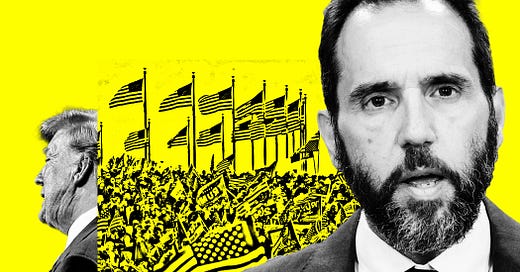Our Last Chances to Hold Trump Accountable
While Jack Smith’s target letter signals that Trump is still accountable under the law, the former president plans to use another term to hoist himself above it.
YESTERDAY’S TRUTH SOCIAL ANNOUNCEMENT by Donald Trump that he has received a “target” letter from Special Counsel Jack Smith’s team regarding his role in the January 6, 2021 insurrection—since confirmed by the New York Times—undoubtedly suggests that we could see the third set of criminal charges filed against the former president as early as Friday. The letter reportedly cites a handful of criminal statutes that the government may be focused on in its investigation. These include:
Conspiracy to defraud the United States, a charge recommended in a referral by the House January 6th Committee that carries up to 5 years in prison.
Deprivation of civil rights under color of law, which is used to prosecute police officers for excessive force and to address criminal violations of voting rights, and which can produce life in prison or the death penalty.
Witness tampering, the possibility of which was flagged by former Rep. Liz Cheney in connection with Trump aide Cassidy Hutchinson’s testimony before the Jan. 6th Committee, and which can yield up to 20 years in prison.
Reports also indicate that the indictment could include wire or mail fraud arising from Trump’s post–Jan. 6th fundraising based on the Big Lie. This is another charge that would be punishable by up to 20 years in prison.
Although the specifics remain to be seen, the impending indictment is by far the most crucial of the litany of criminal charges now lodged against the former president—including the federal Mar-a-Lago indictment and the financial crimes charged by the Manhattan DA—because it strikes at the heart of the rule of law and the sanctity of the U.S. Constitution. Whatever the downsides of four more years of Joe Biden, it is clear that American democracy cannot survive another Trump presidency.
To understand why, one need only glance at another vital piece of recent reporting by the New York Times that Trump and his allies intend to fundamentally reshape the office of the presidency if they regain the White House in 2024. Russell T. Vought, head of the Office of Management and Budget under Trump, summed it up succinctly: “What we’re trying to do is identify the pockets of independence and seize them.”
If this sounds scary, it should.
This plan is not entirely new. Thirteen days before the 2020 presidential election, Trump issued an executive order to remake large swaths of the federal workforce. Secretly developed over the preceding six months, it aimed to reassign tens of thousands of civil servants with influence over federal policy as “Schedule F” employees, stripping them of employment protections in order to render them vulnerable to at-will termination by the president. Trump explained the idea at a rally in March of 2022: “We will pass critical reforms making every executive branch employee fireable by the president of the United States. The deep state must and will be brought to heel.” Under current law, presidents appoint around 4,000 people to government roles during their administration, and those employees can legally operate as de facto loyalists. Schedule F would increase that number to as many as 50,000.
Trump’s Schedule F order was rescinded on the third day of the Biden administration, but Trump could bring it back if reelected in 2024, and his allies are making plans to meet the staffing needs that would result. The most significant of these is called “Project 25,” a $22 million operation spearheaded by the conservative Heritage Foundation, which would create a LinkedIn-type database of up to 20,000 potential recruits for the next GOP presidential administration. According to the president of Heritage, Kevin Roberts: “In 2016, the conservative movement was not prepared to flood the zone with conservative personnel. On Jan. 20, 2025, things will be very different. This database will prepare an army of vetted, trained staff to begin dismantling the administrative state from Day 1.”
Trump and other 2024 GOP presidential candidates have been briefed on the project, and while their hopes for the profiles of those included in the database vary, Trump’s preferences will almost certainly be prioritized; that’s in part because the key people involved in setting it up are former Trump administration officials, as the New York Times reports. And for the former president, the criteria for inclusion in such a database will undoubtedly include abject loyalty to him and a willingness to flout the rule of the law and the Constitution if necessary to advance Trump’s political interests—the precise traits that led so many enablers to support the Big Lie.
Additional plans for a second Trump administration are listed on his campaign website. Several involve enhanced, potentially unaccountable presidential power, such as:
restoring the president’s “impoundment” power, which was outlawed by Congress after its abuse by President Richard Nixon, so the president could refuse to spend money appropriated by Congress for programs the president dislikes;
bringing agencies with legal independence from the White House—such as the Federal Communications Commission and the Federal Trade Commission—under immediate presidential control;
erasing the Department of Justice’s post-Watergate tradition of independence from the White House by “Firing the Radical Marxist Prosecutors Destroying America,” thereby greenlighting presidents to direct criminal investigations of political rivals; and
dismantling the intelligence community’s “massive censorship, surveillance, and propaganda campaign against the American people”—which means, in Trump’s own words, “clean[ing] out all of the corrupt actors in our national security and intelligence apparatus,” presumably to replace them with MAGA loyalists.
With three criminal trials anticipated in his immediate future and another that’s probably forthcoming out of Fulton County, Georgia, a centerpiece of the Trump 2024 campaign will be targeted lies for the purpose of criminal defense preparation. For Trump, it’s not all bad—the campaign saw a surge in donations after his first federal indictment, which arose from the troves of classified records found at his Mar-a-Lago resort. He also might not see the inside of a courtroom for a long time as his team attempts to delay criminal proceedings against him until after the election. But the question of whether a jury will one day hold him accountable for attempting to steal the presidential election from the American people is less important than the fact that there will soon be a January 6th indictment against Trump himself. It signals that, at least for now, the gears of American justice are still functioning.






